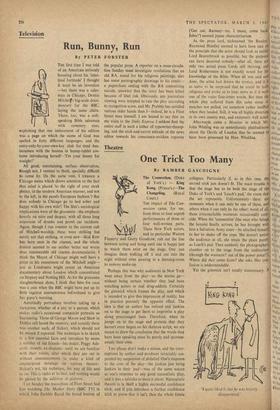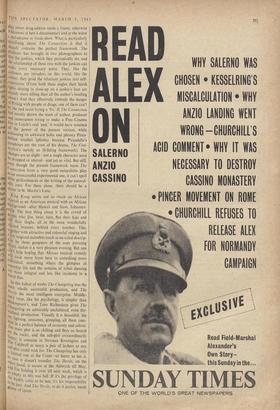Theatre
One Trick Too Many
By BAMBER GASCOIGNE The Connection. (Duke of York's.) — King Kong. (Prince's.)—The Changeling. (Royal Court.) Perhaps this was why audiences in New York went away from the play—so the stories go— without being certain whether they had been watching actors or real drug-addicts. Certainly the gimmick which frames the play, and which intended to give this impression of reality, has in practice precisely the opposite effect. The idea is that an author has enticed real junkies on to the stage to get them to improvise a play along prearranged lines. Therefore, when he jumps on to the stage and protests that they haven't even begun on his skeleton script, we are meant to draw the conclusion that the words they have been speaking must be purely and spontan- eously their own.
Two pluses don't make a minus, and the inter- ruptions by author and producer invariably sus- pended my suspension of disbelief. One's response to the core of the play—the junkies just being junkies in their 'pad'—was of the same nature as one's response to any good naturalistic play, and it was a mistake to mess it about. Naturalistic theatre is in itself a highly successful confidence trick, and if you introduce a further confidence trick to prove that it isn't, then the whole fabric
collapses. Particularly if, as in this case, th second trick just doesn't fit. The main trouble j5 that the stage has to be both the stage of the Duke of York's and 'Leach's pad,' the room that the set represents. Unfortunately there are moments when it can only be one of these, and others when it can only be the other; worst of all, these irreconcilable moments occasionally coin' cide. When the 'connection' (the man who brings the heroin) finally arrives, he has brought with him a Salvation Army sister—he attached himself to her to shake off the cops. She doesn't notice the audience at all, she treats the place purely as Leach's pad. Then suddenly the photographer; clamber on to the stage from the auditorium (through the wainscot? out of the power point?). Where did they come from? she asks. Her con- fusion is understandable.
Yet the gimmick isn't totally unnecessary. A 'I quite liked it, but he was bitterly disappointed.'
play about drug-addicts needs a frame, otherwise it becomes at best a documentarY and at the worst melodrama or freak-show. What is particularly tantalising about The Connection is that it ready contains the perfect framework. The Producer has brought in two photographers to 11191 the junkies, which they periodically do, and Ihe relationship of these two with the junkies can ake every 'necessary point. They, like the itlienec, are intruders on this world; like the Ithor, they prod the reluctant junkies into self- Pression. (From both these angles their harsh thts shining in close-up on a junkie's face arc ready more telling than all the author's bustling tout.) And they effectively embody the danger
flirting with people or drugs; one of them can't
r the end resist trying a 'fix.' If The Connection td merely shown the team of author, producer .1ld cameramen trying to make a Free Cinema film in Leach's real 'pad,' it would have retained
I the power of the present version, while jettisoning its awkward holes and phoney Piran-
dellian touche's (phoney because Pirandello's Paradoxes are the root of his drama, The Con- nection's merely an ill-fitting framework). The changes are so slight—not a single character need be dropped or altered—and yet so vital. But still, e'en though the present framework turns The C'imection from a very good naturalistic play I) an unsuccessful experimental one, it can't spoil these Performances or the writing of the natural-
Le core. For these alone, there should be a the (;, 7eue in St. Martin's Lane. hit 7„in:2
are musical Kong seems not so much an African qusical as an American musical with an African tnd 11-.14ground—after Hawaii and Siam, Johannes- The best thing about it is the crowd of
-„
YPIe who jive, twist, turn, flex their hips and (.11 their thighs, all in the most wonderfully
'“1 \ed manner, behind every number. This, ".tether with attractive and colourful staging and [icea r • ew inspired moments (such as an acted descrip- elY • by three gangsters of the cops pursuing ,ers
makes it a very pleasant evening. But one LIM help hoping that African musical comedy "l soon move from here to something more on- Ilitvidual, something where the glimpses of "Anship life and the remains of tribal dancing A ''e more integral and less like incidents in a film.
Ill this fullest of weeks The Changeling was the I;;`)'t wholly successful production, and The Ills the most intelligent enterprise. Middle- °11.5 verse, like his psychology, is simpler than Shakespeare's, and Tony Richardson gives The ,:langeting an admirably uncluttered, even for- 'lised, production. Visually it is beautiful; the be.1' lighting, costumes, grouping, all these com- bine in a perfect balance of economy and colour. 0.'e main plot is as chilling and fiery as Scotch fun the rocks, and the sub-plot extraordinarily Zoe it contains in Norman Rossington and subplot Caldwell as saucy a pair of lechers as any ,".11-Plot could wish for. The Changeling has only limited run at the Court—so hurry to see it, 51., ease it doesn't transfer. The Devils, on the other hand, is secure at the Aldwych till May, aidI n1 holding it over till next week, which is tk_emPty as this was full. If its the privilege of "c Weekly critic to be late, it's his responsibility Albe • lust. And The Devils, to do it justice, needs enlY of space.







































 Previous page
Previous page